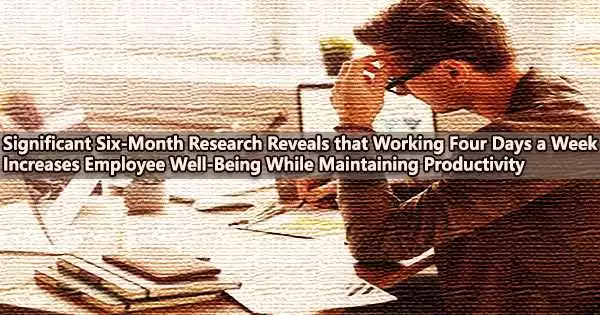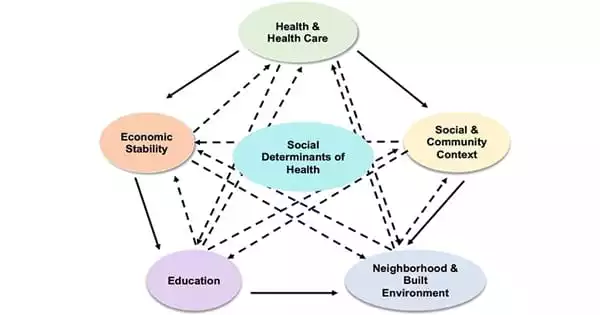In the UK, 61 firms made a commitment to a 20% decrease in working hours for all employees during a six-month period beginning in June 2022. The vast majority of companies also retained full-time productivity targets.
With 71% of workers self-reporting lower levels of “burnout” and 39% stating they were less stressed, data from the largest four-day working week trial in the world show significantly lower rates of stress and illness in the workforce.
In comparison to the same period the prior year, there was a 65% decrease in sick days and a 57% decrease in the number of employees leaving participating organizations. During the trial period, the company’s revenue hardly moved and only slightly increased on average by 1.4%.
Around 92% of the businesses who participated in the U.K. pilot program (56 out of 61) indicate they intend to continue with the four-day working week, with 18 businesses confirming the change as permanent, according to a report of the findings that was sent to U.K. lawmakers.
Research for the U.K. trials was conducted by a team of social scientists from the University of Cambridge, working with academics from Boston College in the U.S. and the think tank Autonomy. The trial was organized by 4 Day Week Global in conjunction with the U.K.’s 4 Day Week Campaign.
Almost 2,900 employees from businesses all throughout the U.K. took part, skipping a day of work. The companies taking part in the trial included everything from financial service providers and internet shops to animation studios and a neighborhood fish and chip store.
Other industries represented include consultancy, housing, IT, skincare, recruitment, hospitality, marketing, and health care.
Employees were polled periodically throughout the study to assess how having an extra day off affected them. Among all workforces, self-reported levels of worry and exhaustion dropped, and both mental and physical health improved.
Almost everyone we interviewed described being overwhelmed with questions from other organizations in their industry that are interested in following suit. When we ask employers, a lot of them are convinced the four-day week is going to happen. It has been uplifting for me personally, just talking to so many upbeat people over the last six months. A four-day week means a better working life and family life for so many people.
Sociologist Prof. Brendan Burchell
Several survey participants reported finding it simpler to juggle work with social and family obligations: 60% of workers indicated an improved capacity to mix paid job with care obligations, and 62% considered it simpler to integrate work with social life.
“Before the trial, many questioned whether we would see an increase in productivity to offset the reduction in working time but this is exactly what we found,” said sociologist Prof. Brendan Burchell, who led the University of Cambridge side of the research. “Many employees were very keen to find efficiency gains themselves. Long meetings with too many people were cut short or ditched completely. Workers were much less inclined to kill time, and actively sought out technologies that improved their productivity.”
Dr. David Frayne, a Research Associate at the University of Cambridge, said, “We feel really encouraged by the results, which showed the many ways companies were turning the four-day week from a dream into realistic policy, with multiple benefits.”
Joe Ryle, Director of the 4 Day Week Campaign, calls the results a “major breakthrough moment” for the idea of shorter working weeks. “Across a wide variety of different sectors of the economy, these incredible results show that the four-day week actually works.”
In addition to the survey work, designed in collaboration with colleagues including Prof. Juliet Schor from Boston College, the Cambridge team conducted a large number of extensive interviews with employees and company CEOs before, during and after the six-month trial.
Many of the same researchers that did the research for other 4 Day Week Global pilot projects in the United States and Ireland have previously published their findings. The U.K. experiment, however, is the first to use in-depth interview research in addition to being the largest to date.
“The method of this pilot allowed our researchers to go beyond surveys and look in detail at how the companies were making it work on the ground,” said Frayne, from Cambridge’s Department of Sociology.
Regarding motivations, numerous senior managers disclosed to researchers that they viewed the four-day workweek as a reasonable response to the epidemic and thought it would provide them a competitive advantage in luring talent in the post-COVID labor market.
Some saw it as a desirable alternative to unrestricted working from home, which they believed endangered workplace culture. Some people felt a greater “moral responsibility” to their coworkers after witnessing the pandemic-related health issues and bereavements that they had witnessed.
“I hated the pandemic, but it’s made us see each other much more in the round, and it’s made us all realize the importance of having a healthy head, and that family matters,” said the CEO of a non-profit organization that took part in the trial.
Yet, many claimed that reduced hours were being proposed as a solution to hard or emotionally taxing work long before COVID. The CEO of a video game company cited prominent instances of “crunch and burnout” in his sector as justification for participating in the trial.
However, none of the organizations that participated in the trials were doing so because technology had made them less dependent on human labor.
On a three-day weekend, some businesses totally suspended operations, while others staggered a smaller workforce across a week. A restaurant determined that its 32-hour workweek would have long opening hours in the summer but substantially fewer opening hours in the winter.
Fewer holiday days, the understanding that personnel could be called in at short notice, or a “conditional” four-day workweek that only persisted if performance goals were fulfilled were some of the conditions that a few organizations participating in the trial attached to the decreased hours.
Interviews documented how companies reduced working hours without compromising on targets. Common methods included shorter meetings with clearer agendas; introduction of interruption-free “focus periods”; reforming email etiquette to reduce long chains and inbox churn; new analyses of production processes; end-of-day task lists for effective handovers or next-day head starts.
When asked how they used their extra time off, employees cited “life admin” activities like grocery shopping and housework by far and away the most. Many explained how this allowed them a proper break for leisure activities on Saturday and Sunday.
“It was common for employees to describe a significant reduction in stress,” said researcher and Cambridge Ph.D. candidate Niamh Bridson Hubbard. “Many described being able to switch off or breathe more easily at home. One person told us how their ‘Sunday dread’ had disappeared.”
For some parents of young children, a midweek day off meant savings on childcare expenses. For those with older children, it meant some welcome “me time.” All of them said they were engaging in more of the hobbies they currently had, from volunteering to cooking to sports. Although some discovered new interests, others used the time to advance their careers.
“When you realize that day has allowed you to be relaxed and rested, and ready to absolutely go for it on those other four days, you start to realize that to go back to working on a Friday would feel really wrong stupid actually,” said the CEO of a consultancy organization involved in the trial.
Employees reported a generally favorable work environment, feeling more appreciated by their employer, and experiencing a sense of purpose that came from working toward the achievement of the four-day workweek.
While some employees at creative organizations voiced concern over lost workplace camaraderie due to “focus time,” others at one large corporation expressed concerns about increasing workloads and stated that unconstrained conversation frequently sparks original ideas.
By the end of the six-month trial, many of the managers said they could not imagine returning to a five-day week.
“Almost everyone we interviewed described being overwhelmed with questions from other organizations in their industry that are interested in following suit,” said Burchell. “When we ask employers, a lot of them are convinced the four-day week is going to happen. It has been uplifting for me personally, just talking to so many upbeat people over the last six months. A four-day week means a better working life and family life for so many people.”
















